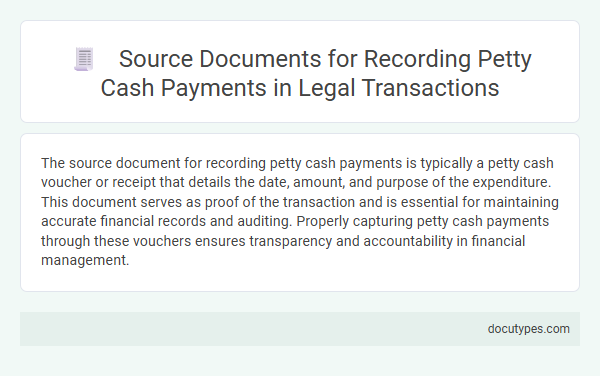The source document for recording petty cash payments is typically a petty cash voucher or receipt that details the date, amount, and purpose of the expenditure. This document serves as proof of the transaction and is essential for maintaining accurate financial records and auditing. Properly capturing petty cash payments through these vouchers ensures transparency and accountability in financial management.
Introduction to Source Documents in Legal Petty Cash Payments
What is the source document for recording petty cash payments in legal contexts? Source documents for petty cash payments serve as official records that justify and verify each transaction. These documents ensure transparency and accuracy in maintaining petty cash accounts within legal frameworks.
Importance of Accurate Documentation in Legal Finance
The source document for recording petty cash payments is typically a petty cash voucher or receipt. This document provides a detailed record of each transaction, including the date, amount, purpose, and authorization.
Accurate documentation of petty cash payments is crucial in legal finance to ensure transparency and accountability. It helps prevent misuse of funds and supports the audit trail required by regulatory authorities. Proper records also facilitate dispute resolution and compliance with financial regulations, safeguarding the organization's legal interests.
Types of Source Documents for Petty Cash Transactions
| Type of Source Document | Description | Role in Petty Cash Transactions |
|---|---|---|
| Receipts | Receipts are issued for small purchases or expenses paid using petty cash. They provide evidence of the transaction. | Serve as primary proof for petty cash disbursements, helping to verify the amount spent and the nature of the expense. |
| Petty Cash Vouchers | These are forms completed by employees or authorized persons who disburse petty cash. The voucher details the purpose, amount, and date of the payment. | Function as a formal internal record, often requiring approval to support petty cash payments before reimbursement. |
| Invoices | Invoices from vendors or suppliers may accompany petty cash payments where goods or services were purchased. | Provide documentation to support the legitimacy of expenses charged to petty cash. |
| Expense Reports | Consolidated reports submitted by employees showing multiple petty cash expenses for reimbursement or recordkeeping. | Help ensure accountability and tracking of petty cash use over a period, useful for audits and reconciliations. |
| Bank Deposit Slips | Documents showing replenishment of the petty cash fund through bank deposits. | Confirm the source of cash added back to the petty cash fund, maintaining proper fund balance. |
Your petty cash payments should always be supported by proper source documents to maintain clear, accurate financial records and comply with legal accounting standards.
Receipts as Primary Evidence for Petty Cash Disbursements
Receipts serve as the primary source documents for recording petty cash payments in legal and financial contexts. They provide essential evidence that validates each disbursement made from the petty cash fund.
- Receipts as Proof of Transaction - Receipts document the exact amount spent and the purpose of the petty cash disbursement.
- Legal Compliance - Maintaining receipts ensures adherence to accounting standards and legal audit requirements.
- Accountability and Transparency - Receipts help track petty cash usage, preventing misuse and supporting transparent financial management.
Vouchers for Validating Petty Cash Payments in Legal Firms
In legal firms, vouchers serve as the essential source document for recording petty cash payments. These vouchers ensure proper validation and provide a clear audit trail for all small cash disbursements.
- Petty Cash Voucher Creation - Each voucher documents the payment date, amount, and purpose, ensuring accurate record-keeping for legal expenses.
- Authorization Requirement - A responsible person's signature on the voucher confirms approval and legitimacy of the petty cash expense.
- Supporting Receipts - Receipts or invoices attached to the voucher act as proof of payment and support compliance with legal accounting standards.
Petty Cash Slips: Structure and Usage in Legal Context
The source document for recording petty cash payments is the petty cash slip, a crucial record in legal accounting practices. Petty cash slips typically include details such as the date, amount, purpose of the expense, and signatures approving the disbursement, ensuring accuracy and accountability. In a legal context, these slips serve as evidence of transactions, supporting compliance and audit trails for petty cash management.
Recording and Filing Procedures for Legal Petty Cash Documents
The source document for recording petty cash payments is typically a petty cash voucher or receipt that details each transaction. Proper recording and filing procedures ensure legal compliance and accurate financial tracking.
- Petty Cash Voucher - This document captures the date, amount, purpose, and authorization of each petty cash payment.
- Recording Entry - Each petty cash transaction must be promptly entered into the accounting system using the voucher as support.
- Document Filing - Legal petty cash documents should be securely stored and organized chronologically for audit and verification purposes.
You must maintain these records meticulously to uphold transparency and meet legal accounting standards.
Audit Trails: Ensuring Compliance in Petty Cash Management
The source document for recording petty cash payments is typically a petty cash voucher or receipt. This document provides detailed information about the transaction, including the date, amount, purpose, and authorized signatures.
Maintaining accurate source documents creates a reliable audit trail essential for internal control and compliance. Audit trails help verify transactions, prevent fraud, and ensure adherence to company policies and legal requirements in petty cash management.
Best Practices for Managing Source Documents in Legal Transactions
The source document for recording petty cash payments is typically a petty cash voucher, which provides detailed information about the transaction, including the date, amount, purpose, and authorized signatures. Best practices for managing source documents in legal transactions involve maintaining accurate, organized, and tamper-proof records to ensure transparency and compliance with legal requirements. Proper documentation supports audit trails, helps prevent disputes, and protects the integrity of financial processes within legal frameworks.
What Is the Source Document for Recording Petty Cash Payments? Infographic

